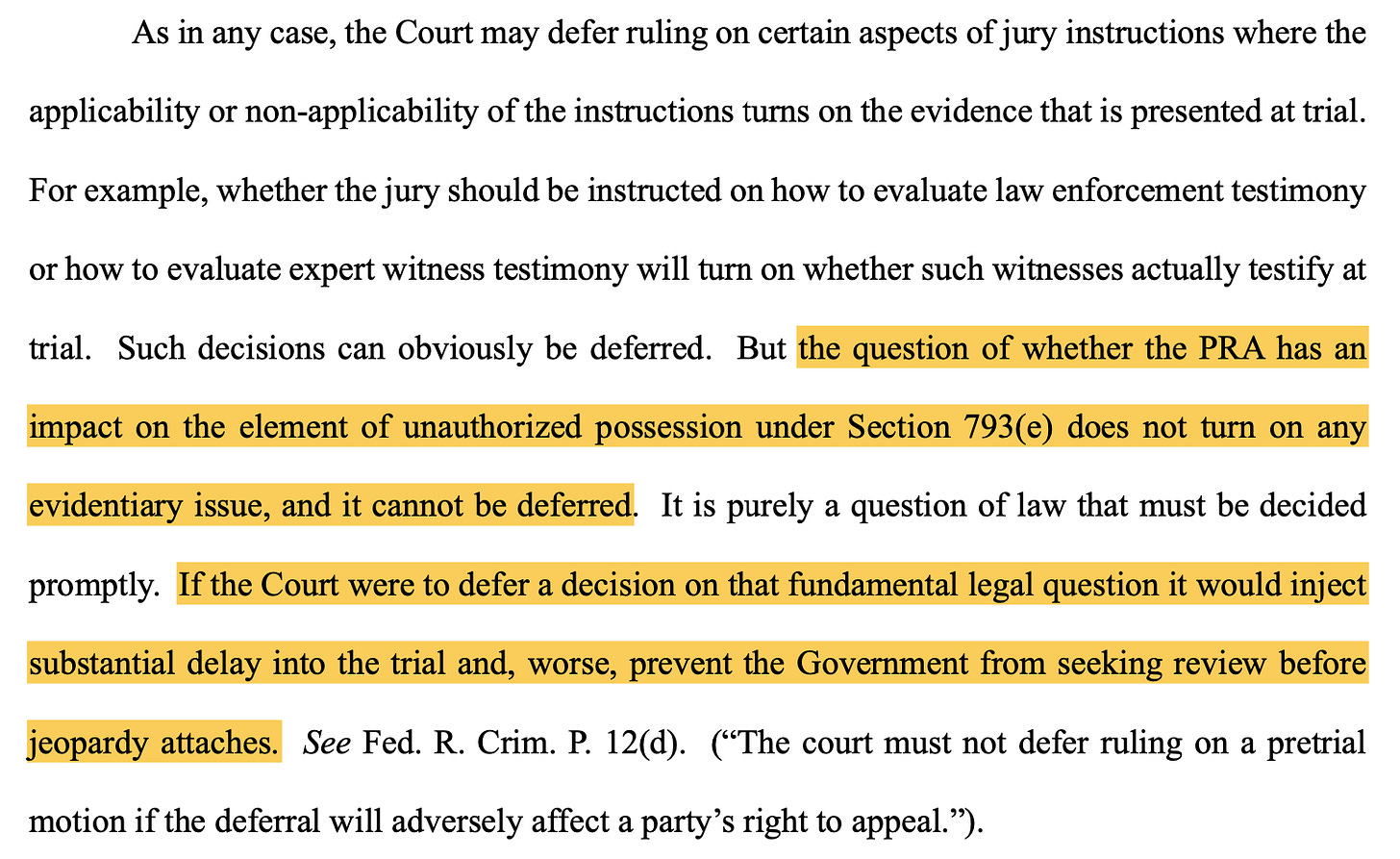Cannon's presidential records order in Trump case puts special counsel in a bind
Although Judge Aileen Cannon rejected Trump's request to have the case dismissed, she also refused to rule on the relevance of the Presidential Records Act in the case.
Judge Aileen Cannon on Thursday dared Special Counsel Jack Smith to take her latest law-free ruling in the classified documents case against Donald Trump to the U.S. Court of Appeals for the Eleventh Circuit.
Whether he will do so, though, is less clear.
The ruling from Cannon — the Trump appointee overseeing Trump’s federal prosecution in Florida — formally rejected Trump’s request to have the case against him dismissed on the basis of the Presidential Records Act (PRA).
At the same time, though, Cannon rejected Smith’s request for a ruling on, as Smith put it, “whether the PRA has an impact on the element of unauthorized possession under Section 793(e)” of the Espionage Act, the law under which Trump has been charged in the case.
In denying that request, Cannon said he was seeking a ruling that would be “unprecedented and unjust.” She provided no reasoning or support for that assertion.
As Smith and his team had laid out, the PRA should have no impact on this case.
Nonetheless, Cannon issued an order on March 18 setting forth two possible “formulation[s] of the law” that the parties were to “engage with” relating to how the PRA could figure into the jury’s consideration of “unauthorized possession” in the case:
Both of those scenarios gave the PRA a more substantial role in the case than Smith thought is justified under the law — even an outcome-determinative one — leading to his most aggressive filing yet before the judge.
Not only did Smith’s response to Cannon’s March 18 order reiterate the argument the the PRA should play no role in the case — “the PRA is irrelevant to the element of unauthorized possession” — it also made clear that “both of the Court’s scenarios are fundamentally flawed and any jury instructions that reflect those scenarios would be error.”
Because of that, the special counsel’s filing continued, the court “must resolve these crucial threshold legal questions promptly” in order to ensure that Cannon does not “jeopardize the Government’s right to a fair trial and deprive it of its right to seek appellate review.”
Smith’s filing made clear both why this is needed — the government needs to know early enough to challenge this — and why it is justified — with cases that support the special counsel’s argument. As Smith and his team wrote:
On Thursday, Cannon ruled that the PRA “does not provide a pre-trial basis to dismiss” the case.1 Then, though, she continued, also ruling that, “to the extent the Special Counsel demands an anticipatory finalization of jury instructions prior to trial, prior to a charge conference, and prior to the presentation of trial defenses and evidence, the Court declines that demand as unprecedented and unjust.”
A lot of words there, but, ultimately they overstate Smith’s request with no reliance on precedent in order to reject ruling on it. (The “citation” is to Smith’s filing.) What’s more, Smith and his team specifically addressed the concern animating Cannon’s statement in that very filing:
Nonetheless, Cannon refused to rule.
Then, she lit the fuse.
“As always, any party remains free to avail itself of whatever appellate options it sees fit to invoke, as permitted by law,” she concluded the ruling.
In one very real sense, Thursday’s ruling put the special counsel’s office in a better position because one of Trump’s arguments to avoid the start of trial was rejected.
In another sense, though, Thursday’s ruling put Smith in a worse position because Cannon left open the door to issuing a ruling once the jury is seated and jeopardy has attached that either directly under Rule 29 or indirectly through the jury instructions would render the prosecution a nullity.
As such, Smith will need to decide whether to go full-steam ahead, taking the denial of the motion to dismiss as a good enough sign; whether to take some other pretrial effort to get a ruling on this issue; or whether to take either of the “break glass in case of fire” options, seeking a writ of mandamus from the Eleventh Circuit ordering action from Cannon or seeking recusal of Cannon. Both of those latter moves are steps that Smith will try to avoid altogether or take only when he has decided there are no other options, so I wouldn’t expect them just yet.
But, if there is no success at getting an answer on this question — which Smith clearly believes must be resolved — before a jury is to be seated, I expect we will see Smith’s team either create an appealable order on this issue or take one of those latter steps.
This sentence initially stated this was done “as Smith urged.” While Smith certainly urged for Trump’s motion to be denied, this was not the grounds on which he sought the denial. To avoid confusion, the “as Smith urged” language was removed at 11:15 p.m.








Any presumption at this point that Judge Cannon will (or can) be competently impartial in this matter is inexcusably naive. Once Smith brings the matter before the appellate court, the compelling need to remove her cannot be ignored or gainsaid. Her record betrays both incompetence and bias. The delay is unfortunate but better than injustice.
Smith's filing definitely seemed to lay the groundwork for mandamus by putting Cannon on notice that she has a duty to rule on this matter of law in a timely manner – at the very latest before jeopardy attaches. I agree he probably won't pull that trigger yet; he'll probably find ways to needle her a few more times to deliver a clear answer. But it seems like the solid start of building a record he can take to the 11th to say "make her do her job and rule".